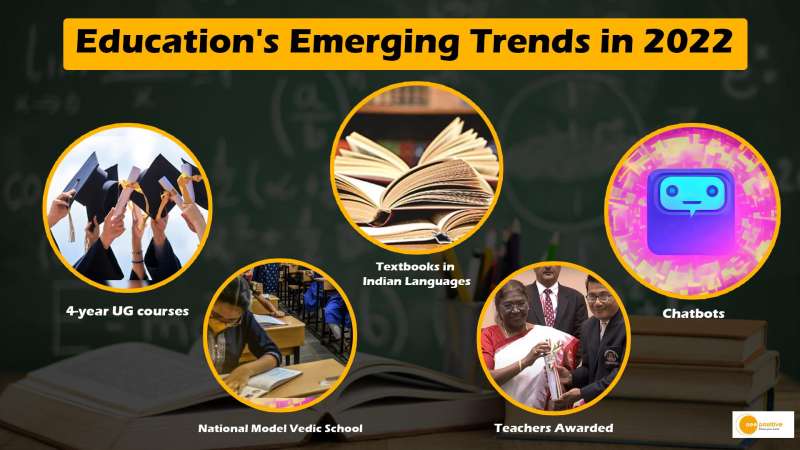

Businesses are rapidly evolving to embrace digital transformation. To embrace this change, however, extensive research and study will be required. This has set in motion new educational trends that were previously unheard of. From purely online teaching to hybrid models during COVID-19, a diverse range of methods is now being rapidly adopted from primary classrooms to university levels.
New opportunities for students wishing to pursue a career in this ever-changing world are now emerging within the larger education sector. This leads to an interesting discussion about the top education trends that the education sector is pursuing.
Top Education Trends
1. Using Chatbots to Enhance Customer Service
By 2022, it was expected that 45% of enterprises’ customer support services will be powered by chat-bots, which are being used by more and more businesses as a way to improve customer engagement. In this context, there would be a rise in need for jobs in consumer analysis, travel, learning and development, and lead nurturing. This AI-based application is much helpful for the student community at large as intricate aspects like coding is also easily explained by this.
2. UGC to Translate Undergraduate Textbooks to Indian Languages
The University Grants Commission has set a 6- to 12-month time frame for translating undergraduate course textbooks into Indian languages. The announcement came following a meeting between UGC officials and international publishers to discuss translation. According to a report in The Hindu, UGC Chairperson M. Jagadesh Kumar convened an online meeting attended by representatives from major publishers such as Springer Nature, Wiley India, Taylor & Francis, Cengage India, and Cambridge University Press India.
The commission has informed publishers of its intention to encourage Indian authors and academics to translate textbooks into regional languages. Furthermore, the UGC has proposed that a model be jointly developed to offer textbooks in digital format at reasonable prices.
3. The UGC proposes making 4-year UG courses mandatory for degrees with honours
Students wishing to graduate with honours in any subject will be required to pursue four-year undergraduate programmes, according to new regulations expected to be announced by the University Grants Commission (UGC) on Monday (FYUP).
However, the move will have no effect on students who have enrolled in four-year undergraduate programmes at Delhi University, which allows students to graduate with honours after six semesters or three years, according to Vice-Chancellor Yogesh Singh.
According to the draught UGC regulations on the curriculum and credit framework for undergraduate programmes, “students who wish to pursue a three-year UG programme will be awarded a UG Degree in the Major discipline after successfully completing three years, securing 120 credits, and satisfying the minimum credit requirement.”
According to the UGC, in order to obtain an undergraduate honours degree, a student must complete four-year programmes totaling 160 credits. At the DU, however, honours degrees are awarded to students who complete a three-year undergraduate programme in a specific discipline in addition to those who complete four-year courses.
Meanwhile, the UGC regulations will permit students who have already enrolled in and are pursuing a three-year UG programme under the current Choice Based Credit System (CBCS) to pursue an FYUP. “The university may offer bridge courses (including online) to help them transition,” said UGC chairperson Prof M Jagadesh Kumar.
4. India’s Second National Model Vedic School
The RAVV, or National Model Vedic School, has opened on the Central Sanskrit University campus. The Maharishi Sandipani Rashtriya Ved Vidya Pratishthan is the first of its kind in Ujjain, Madhya Pradesh.
The RAVV, or National Model Vedic School, has opened on the Central Sanskrit University campus. The Maharishi Sandipani Rashtriya Ved Vidya Pratishthan is the first of its kind in Ujjain, Madhya Pradesh.
“I consider myself fortunate to be able to inaugurate this institute, also known as the Shree Jagannath Rashtriya Adarsh Veda Vidyalaya. “The goal of this institute is to preserve and disseminate knowledge of the Vedas,” Pradhan explained.
The institute, a residential school that will provide free education and lodging, will also help promote the Sanskrit language, he said.
In addition to courses on the four Vedas (Rigveda, Samaveda, Yajurveda, and Atharvaveda), students will be able to choose science, English, mathematics, Vedic mathematics, social science, computer science, and agriculture as part of their curriculum.
According to officials, admission will be based on merit in ‘Veda Bhusan’ fourth (Class 9), ‘Veda Bhusan’ fifth (Class 10), ‘Veda Vibhusan’ first (Class 11), and ‘Veda Vibhusan’ second (Class 12).
Courses will begin in the academic year 2022-23.
5. Indian Teachers Awarded by the Hon’ble President of the Country
President of India Droupadi Murmu presented the National Teachers Awards 2022 to 46 outstanding teachers from across India. Teachers from Telangana, Maharashtra, Haryana, Himachal Pradesh, and Punjab were among those who received the prestigious award.
The awards were presented at Vigyan Bhavan in New Delhi. PM Narendra Modi is expected to meet with all of the winners at his home. Every National Teachers Awards winner receives a meditation certificate, a cash prize of Rs 50,000, and a silver medal.
Gamchi Timre R Marak, Mamta Ahar, Rajni Sharma, Amit Kumar, Arun Kumar Garg, Kandala Ramaiah, Khursheed Ahmed and Mohd Jabir were presented National Teachers’ Award 2022 by the President of India.
Speaking on the occasion, the President, a former teacher, recalled her teachers, saying that they not only taught her but also loved and inspired her.
She was the first daughter in her village to attend college, thanks to the support of her family and teachers. She stated that she is forever grateful to her teachers for everything she has accomplished in life.
According to President Droupadi Murmu, science, research, and innovation are the foundations of development in today’s knowledge economy. School education will lay the groundwork for further strengthening India’s position in these areas.


